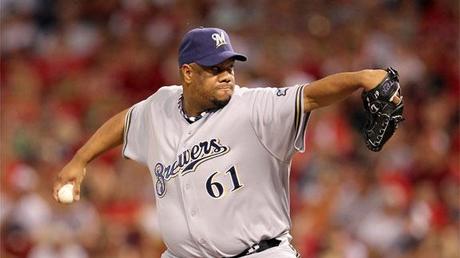The length of major league games has gotten out of hand. And it’s not just the players’ fault. TV commercials play a huge role in lengthening the games because innings are not allowed to start until the time for commercials is finished. That’s why it takes forever for MLB players to get out of the dugout at

Livan Hernandez … “The Human Rain Delay”
the end of an inning. No sense leaving the dugout if the umps are going to hold the game up anyway.
Commercial time is not in place at the lower levels so there are more things pitchers can do to speed up the game. If a pitcher does the following, not only will he speed up the game (which his teammates will love!) but he will also make the opposing hitters very uncomfortable. Also a very good thing.
Throw more strikes. Hitting is hard. Throw the ball right down the middle and low until you get two strikes. Then move to the corners. When you aim for the middle, a young pitcher will rarely throw it there. His natural inaccuracy will take it to the corners. Throw to the corners early in the count and it will either move off the plate or move back over the heart of the plate.
Do not leave the mound unless you have to. Stay on the dirt. Do not walk towards the catcher after every pitch. You waste energy having to walk back up the mound each time and it also wastes time. Stay on the hill. The catcher can reach you just fine. And stop walking around the mound too. Your teammates hate it.
Come set quickly. There is absolutely no advantage to getting the sign from the catcher and taking 5 seconds to come set before your delivery.
Hold runners strategically. If a runner has no lead, don’t try a pickoff play. If a runner is extremely big and slow, don’t waste time giving three looks before your delivery. He’s not going anywhere.
Jog at least to the lines. I may be in the minority here but there is absolutely no harm in a pitcher jogging to the foul line on the way out of the dugout and walking to the mound from there. Same thing when leaving the field. Jog to the foul line and walk the rest of the way to the dugout. If they can’t do those small jogs, they are out of shape.
Don’t use all your pre-inning pitches. Each pitcher gets 8 pitches before the first inning and 5 pitches each pre-inning thereafter. There is nothing in the rule book that says you must use them all. In the hot months I had a rubber arm. Three pitches between innings was all I needed. Two from the wind-up and one from the stretch for the catcher to throw down to second base. If I shaved off two pitches before each of the first 6 innings, that’s 12 pitches saved. That’s another inning’s worth!.
Put all these things together and games will move much faster. And hitters hate it. If a pitcher jogs to the mound (or at least the line), shaves off a pitch or two before the inning starts, pounds the zone with early strikes, stays on the mound and doesn’t waste time between pitches, hitters will feel rushed. No sooner do they come off the field and the ump is yelling “batter up!”
A quick pitcher is a well-liked pitcher. There were several occasions where, after throwing a sub two-hour game, my teammates paid for all my “beverages” that night.
Do everyone a favor and work quicker.
Tomorrow’s post: Hey base stealers, steal early in the count

